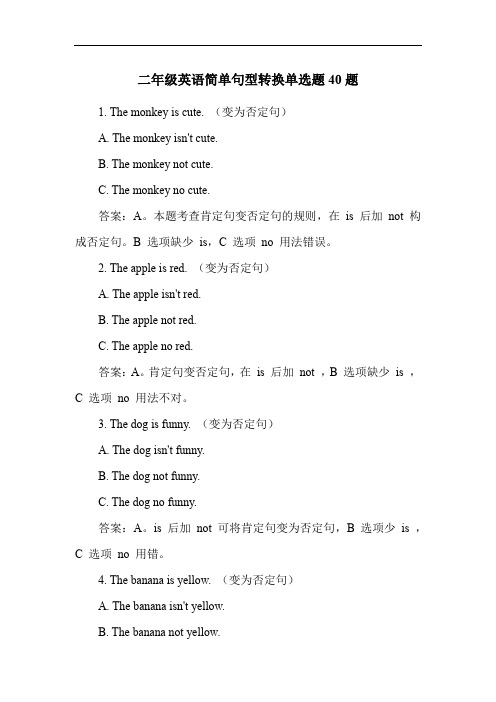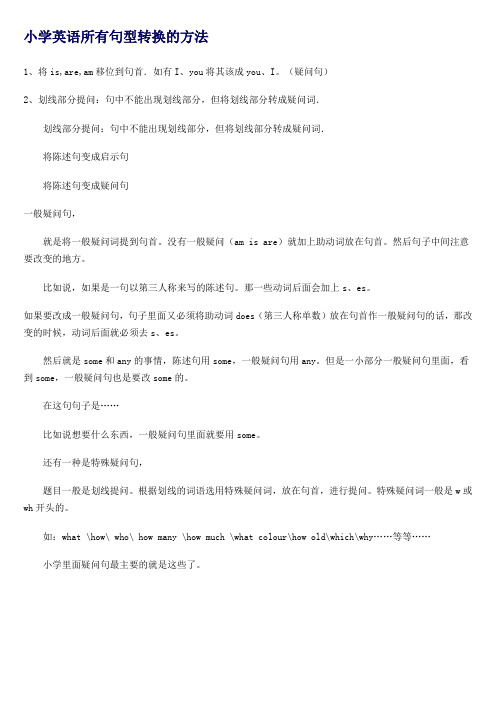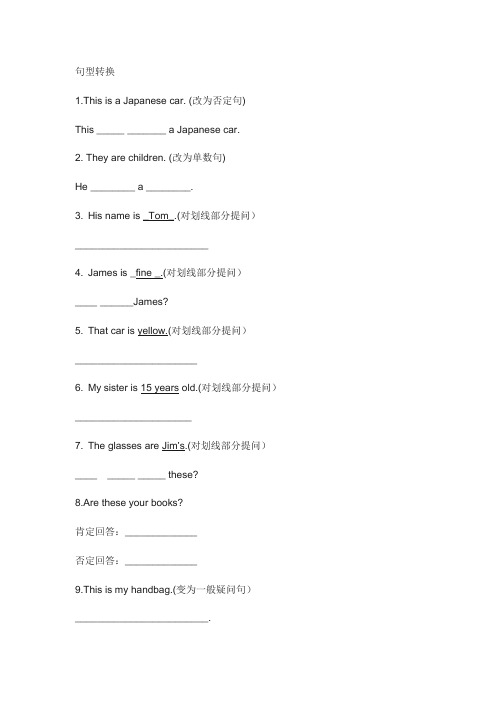句型转换(简单版)
二年级英语简单句型转换单选题40题

二年级英语简单句型转换单选题40题1. The monkey is cute. (变为否定句)A. The monkey isn't cute.B. The monkey not cute.C. The monkey no cute.答案:A。
本题考查肯定句变否定句的规则,在is 后加not 构成否定句。
B 选项缺少is,C 选项no 用法错误。
2. The apple is red. (变为否定句)A. The apple isn't red.B. The apple not red.C. The apple no red.答案:A。
肯定句变否定句,在is 后加not ,B 选项缺少is ,C 选项no 用法不对。
3. The dog is funny. (变为否定句)A. The dog isn't funny.B. The dog not funny.C. The dog no funny.答案:A。
is 后加not 可将肯定句变为否定句,B 选项少is ,C 选项no 用错。
4. The banana is yellow. (变为否定句)A. The banana isn't yellow.B. The banana not yellow.C. The banana no yellow.答案:A。
肯定句变否定句要在is 后加not ,B 选项没is ,C 选项no 不对。
5. The cat is lovely. (变为否定句)A. The cat isn't lovely.B. The cat not lovely.C. The cat no lovely.答案:A。
把肯定句变成否定句,在is 后加上not 就行,B 选项缺is ,C 选项no 用得不对。
6. I am eating lunch. (改为一般疑问句)A. Are you eating lunch?B. Do you eat lunch?C. Is you eating lunch?答案:A。
小学语文句式转换归纳

小学语文句式转换归纳在小学语文学习中,句式转换是一个重要的语法知识点。
它不仅帮助学生更好地理解和运用语言,还能提高他们的写作和表达能力。
本文将重点归纳小学语文中常见的句式转换类型及其转换方法。
陈述句和感叹句的转换是小学语文句式转换的基本形式之一。
这种转换通常是通过添加感叹词或改变句子的语调来实现的。
例如:疑问句和反问句的转换也是小学语文中常见的句式转换形式。
这种转换是通过将疑问词放在句子前面或将肯定变为否定来实现的。
例如:肯定句和否定句的转换是小学语文句式转换中比较简单的一种形式。
这种转换可以通过添加否定词或改变动词的形式来实现。
例如:主动句和被动句的转换是小学语文句式转换中比较复杂的一种形式。
这种转换可以通过改变动词的形式和主语来实现。
例如:祈使句和陈述句的转换也是小学语文中常见的句式转换形式。
这种转换可以通过改变动词的形式和语气来实现。
例如:除了以上五种基本句式转换形式外,小学语文还涉及到一些复杂的句式转换,如复合句、并列句等。
这些复杂的句式转换需要学生掌握更多的语法知识,以便更好地理解和运用语言。
例如:复合句:虽然他学习很努力,但是还是没有考好。
小学语文中的句式转换是帮助学生更好地理解和运用语言的重要知识点之一。
通过掌握不同的句式转换形式和转换方法,学生可以更好地表达自己的思想和情感,提高语言能力和写作水平。
小学语文是小学教育的重要科目之一,对于学生的语言能力和思维能力的发展具有重要的作用。
本文将对小学语文知识进行归纳总结,以便学生更好地掌握语文知识。
拼音是小学语文知识的基础,学生需要掌握拼音的规则和发音,能够正确地拼读和书写。
同时,学生还需要掌握基本的笔画和笔顺,能够正确地书写汉字。
词汇和句子是小学语文知识的重要组成部分。
学生需要掌握常用的词汇和短语,能够正确地理解其意思和用法。
同时,学生还需要掌握句子的结构和语法,能够正确地表达自己的意思。
阅读理解是小学语文知识的重要技能之一。
学生需要掌握阅读理解的基本技巧和方法,能够正确地理解文章的主旨、段落大意和细节内容。
句型转换50个

句型转换50个1. 原句:He is a good student.- 否定句:He isn't a good student.- 一般疑问句:Is he a good student?2. 原句:They play football every day.- 否定句:They don't play football every day.- 一般疑问句:Do they play football every day?3. 原句:She has a beautiful dress.- 否定句:She doesn't have a beautiful dress.- 一般疑问句:Does she have a beautiful dress?4. 原句:I like reading books.- 否定句:I don't like reading books.- 一般疑问句:Do you like reading books?5. 原句:There are some apples on the table.- 否定句:There aren't any apples on the table. - 一般疑问句:Are there any apples on the table?6. 原句:He can speak English well.- 否定句:He can't speak English well.- 一般疑问句:Can he speak English well?7. 原句:My mother made a cake yesterday.- 否定句:My mother didn't make a cake yesterday.- 一般疑问句:Did your mother make a cake yesterday?8. 原句:We will go to the park tomorrow.- 否定句:We won't go to the park tomorrow.- 一般疑问句:Will you go to the park tomorrow?9. 原句:The boy is running fast.- 否定句:The boy isn't running fast.- 一般疑问句:Is the boy running fast?10. 原句:She was at home last night.- 否定句:She wasn't at home last night.- 一般疑问句:Was she at home last night?11. 原句:They have been to Beijing.- 否定句:They haven't been to Beijing.- 一般疑问句:Have they been to Beijing?12. 原句:He had a great time at the party.- 否定句:He didn't have a great time at the party. - 一般疑问句:Did he have a great time at the party?13. 原句:I will be a teacher in the future.- 否定句:I won't be a teacher in the future.- 一般疑问句:Will you be a teacher in the future?14. 原句:There is a lot of water in the glass.- 否定句:There isn't a lot of water in the glass.- 一般疑问句:Is there a lot of water in the glass?15. 原句:She reads English every morning.- 否定句:She doesn't read English every morning.- 一般疑问句:Does she read English every morning?16. 原句:They are going to have a party this weekend.- 否定句:They aren't going to have a party this weekend. - 一般疑问句:Are they going to have a party this weekend?17. 原句:He does his homework carefully.- 否定句:He doesn't do his homework carefully.- 一般疑问句:Does he do his homework carefully?18. 原句:I saw a movie last week.- 否定句:I didn't see a movie last week.- 一般疑问句:Did you see a movie last week?19. 原句:We have a lot of homework to do.- 否定句:We don't have a lot of homework to do.- 一般疑问句:Do you have a lot of homework to do?20. 原句:The cat is sleeping under the tree.- 否定句:The cat isn't sleeping under the tree.- 一般疑问句:Is the cat sleeping under the tree?21. 原句:She will write a letter soon.- 否定句:She won't write a letter soon.- 一般疑问句:Will she write a letter soon?22. 原句:There were some people in the room.- 否定句:There weren't any people in the room.- 一般疑问句:Were there any people in the room?23. 原句:He has lived here for five years.- 否定句:He hasn't lived here for five years.- 一般疑问句:Has he lived here for five years?24. 原句:I am reading an interesting book.- 否定句:I'm not reading an interesting book.- 一般疑问句:Are you reading an interesting book?25. 原句:They played basketball yesterday afternoon.- 否定句:They didn't play basketball yesterday afternoon. - 一般疑问句:Did they play basketball yesterday afternoon?26. 原句:She can dance beautifully.- 否定句:She can't dance beautifully.- 一般疑问句:Can she dance beautifully?27. 原句:My father bought a new car last month.- 否定句:My father didn't buy a new car last month.- 一般疑问句:Did your father buy a new car last month?28. 原句:We are going to see a film tonight.- 否定句:We aren't going to see a film tonight.- 一般疑问句:Are you going to see a film tonight?29. 原句:There is some milk in the fridge.- 否定句:There isn't any milk in the fridge.- 一般疑问句:Is there any milk in the fridge?30. 原句:He likes playing the guitar.- 否定句:He doesn't like playing the guitar.- 一般疑问句:Does he like playing the guitar?31. 原句:I have finished my work.- 否定句:I haven't finished my work.- 一般疑问句:Have you finished your work?32. 原句:They were watching TV at eight o'clock last night.- 否定句:They weren't watching TV at eight o'clock last night. - 一般疑问句:Were they watching TV at eight o'clock last night?33. 原句:She will go shopping tomorrow.- 否定句:She won't go shopping tomorrow.- 一般疑问句:Will she go shopping tomorrow?34. 原句:There are five students in the classroom.- 否定句:There aren't five students in the classroom.- 一般疑问句:Are there five students in the classroom?35. 原句:He has a pet dog.- 否定句:He doesn't have a pet dog.- 一般疑问句:Does he have a pet dog?36. 原句:I am going to visit my grandparents this weekend.- 否定句:I'm not going to visit my grandparents this weekend.- 一般疑问句:Are you going to visit your grandparents this weekend?37. 原句:They have seen that movie.- 否定句:They haven't seen that movie.- 一般疑问句:Have they seen that movie?38. 原句:She was reading a novel when I came in.- 否定句:She wasn't reading a novel when I came in.- 一般疑问句:Was she reading a novel when you came in?39. 原句:He will be back soon.- 否定句:He won't be back soon.- 一般疑问句:Will he be back soon?40. 原句:There were some books on the desk.- 否定句:There weren't any books on the desk.- 一般疑问句:Were there any books on the desk?41. 原句:I can play the piano.- 否定句:I can't play the piano.- 一般疑问句:Can you play the piano?42. 原句:My mother cooks delicious food.- 否定句:My mother doesn't cook delicious food.- 一般疑问句:Does your mother cook delicious food?43. 原句:We had a party last weekend.- 否定句:We didn't have a party last weekend.- 一般疑问句:Did you have a party last weekend?44. 原句:She is going to sing a song at the concert.- 否定句:She isn't going to sing a song at the concert. - 一般疑问句:Is she going to sing a song at the concert?45. 原句:He has read this book twice.- 否定句:He hasn't read this book twice.- 一般疑问句:Has he read this book twice?46. 原句:I saw him in the park yesterday.- 否定句:I didn't see him in the park yesterday.- 一般疑问句:Did you see him in the park yesterday?47. 原句:They will build a new house next year.- 否定句:They won't build a new house next year.- 一般疑问句:Will they build a new house next year?48. 原句:There is a big tree in front of my house.- 否定句:There isn't a big tree in front of my house.- 一般疑问句:Is there a big tree in front of your house?49. 原句:She likes wearing skirts.- 否定句:She doesn't like wearing skirts.- 一般疑问句:Does she like wearing skirts?50. 原句:I am a doctor.- 否定句:I'm not a doctor.- 一般疑问句:Are you a doctor?。
小学英语所有句型转换的方法

小学英语所有句型转换的方法1、将is,are,am移位到句首.如有I、you将其该成you、I。
(疑问句)2、划线部分提问:句中不能出现划线部分,但将划线部分转成疑问词.划线部分提问:句中不能出现划线部分,但将划线部分转成疑问词.将陈述句变成启示句将陈述句变成疑问句一般疑问句,就是将一般疑问词提到句首。
没有一般疑问(am is are)就加上助动词放在句首。
然后句子中间注意要改变的地方。
比如说,如果是一句以第三人称来写的陈述句。
那一些动词后面会加上s、es。
如果要改成一般疑问句,句子里面又必须将助动词does(第三人称单数)放在句首作一般疑问句的话,那改变的时候,动词后面就必须去s、es。
然后就是some和any的事情,陈述句用some,一般疑问句用any。
但是一小部分一般疑问句里面,看到some,一般疑问句也是要改some的。
在这句句子是……比如说想要什么东西,一般疑问句里面就要用some。
还有一种是特殊疑问句,题目一般是划线提问。
根据划线的词语选用特殊疑问词,放在句首,进行提问。
特殊疑问词一般是w或wh开头的。
如:what \how\ who\ how many \how much \what colour\how old\which\why……等等……小学里面疑问句最主要的就是这些了。
古人云“授人鱼,不如授人渔。
”古人尚且知道授人知识不如授人方法的道理,那么在各种理论高度发展的今天为什么就不能多重视一点方法和传授呢?句子教学是英语教学中的重要环节,有了句子作为基础,学生才能学好英语,也才能真正运用英语。
在几年的英语教学中,我总结了一些英语句子教学的小窍门,现简单归纳如下:一、肯定句改否定句的方法——一步法1、在be动词后加not。
如:is not , are not , am not, was not, were not;2、在can,should, will等后加not。
如:cannot, should not, will not;3、上述都没有的,在动词前加助动词否定形式don’t/doesn’t/didn’t。
句型转换ppt课件

在句型转换时,应根据语境和表达需求选择适当的转换方式,如主动句变被动句、肯定句变否定句等 。通过灵活运用不同的转换方式,可以使句子更加丰富多样,增强语言的表现力。
注意句子语序的调整
总结词
在句型转换过程中,语序的调整是一个重要 的技巧。
详细描述
由于中文的语法结构与英语不同,在进行句 型转换时,需要注意语序的调整。通过合理 安排词语的顺序,可以更好地表达句子的意 思,并使句子更加符合中文的表达习惯。在 进行语序调整时,可以参考中文的语法规则 和习惯用法,以确保转换后的句子语序正确 、流畅自然。
示例
将“The cat sat on the mat.” 的主语转换为“A cat sat on a mat.”
谓语转换
谓语转换
改变原句的谓语动词,以表达不同的 语气或强调不同的重点。
示例
将“The dog chased the ball.”的谓 语转换为“The ball was chased by the dog.”
主语错误
主语缺失
主语与谓语搭配不当
在句子中没有明确的主语,导致句子 结构不完整。
主语和谓语之间缺乏逻辑关系或语义 联系。
主语错位
主语的位置不正确,导致句子意思表 达不清。
谓语错误
谓语缺失
句子中缺少谓语,导致句子结构不完整。
谓语错位
谓语的位置不正确,导致句子意思表达不清。
谓语与宾语搭配不当
谓语和宾语之间缺乏逻辑关系或语义联系。
句型转换ppt课件
目 录
• 句型转换简介 • 简单句型转换 • 复合句型转换 • 句型转换技巧 • 句型转换练习 • 句型转换常见错误与纠正
01
句型转换简介
简单句句型转换

句型转换1.This is a Japanese car. (改为否定句)This _____ _______ a Japanese car.2. They are children. (改为单数句)He ________ a ________.3. His name is _Tom_.(对划线部分提问)________________________4. James is _fine _.(对划线部分提问)____ ______James?5. That car is yellow.(对划线部分提问)______________________6. My sister is 15 years old.(对划线部分提问)_____________________7. The glasses are Jim’s.(对划线部分提问)____ _____ _____ these?8.Are these your books?肯定回答:_____________否定回答:_____________9.This is my handbag.(变为一般疑问句)________________________.句型转换1.This is a Japanese car. (改为否定句)This _is ____ __not_____ a Japanese car.2. They are children. (改为单数句)He ____is____ a ______child__.3.His name is _Tom_.(对划线部分提问)______What is his name ?__________________ 4.James is _fine _.(对划线部分提问)__How__ ___is___James?5.That car is yellow.(对划线部分提问)____What color is that car?__________________ 6.My sister is 15 years old.(对划线部分提问)___How old is your sister?__________________ 7.The glasses are Jim’s.(对划线部分提问)_Whose___ __glasses___ __are___ these?8.Are these your books?肯定回答:_Yes, they are.____________否定回答:___No, they are not.__________9.This is my handbag.(变为一般疑问句)____Is this your handbag?____________________.。
句型转换专项练习
小学英语所有句型转换的方法在几年的英语教学中,我总结了一些英语句子教学的小窍门,现简单归纳如下:一、肯定句改否定句的方法:1、在be动词后加not。
如:is not , are not , am not, was not, were not;2、在can,should, will等后加not。
如:cannot, should not, will not;3、上述都没有的,在动词前加助动词否定形式don’t/doesn’t/didn’t。
4、 some 改成any。
如: I am a girl. → I am not a girl.You are a student. →You are not a student.→You aren’t a student.This is Tom’s bag, → This is not Tom’s bag.→ This isn’t Tom’s bag.答题方法是;否定词not在be后边。
二、肯定句改一般疑问句的方法:1、把be动词放在句首,剩下的照抄,(some 改成any,I改成you,my改成your,)句点改成问号。
2、把can,shall, will等放到句首,剩下的照抄,(some 改成any,I改成you,my改成your,)句点改成问号。
3、上述都没有的,在句首请助动词Do/Does/Did帮忙,剩下的照抄,(some 改成any,I改成you,my改成your,)句点改成问号。
注意:句首的第一个字母要大写,句尾标点应为“?”。
如:I am in Class 6. →Are you in Class 6?You are from Ame rica. →Are you from America?It is an orange. →Is it an orange?答题方法是:要想提问,be提前,句末“?”别忘了。
4、就一般疑问句回答一般疑问句有两种回答,即:肯定回答和否定回答。
句型转换方法及练习1
小学英语基本句型转换练习我们现在学过的大多数句型,在一般情况下(就是不排除有特殊情况)都可以用简单的公式来记忆。
I.陈述句(肯定句,否定句)1.肯定句:1) 主语+be动词+….I am a teacher.He is a doctor.They are students.2) 主语+do动词的不同形式+….I play computer games everyday.He plays computer games everyday.We played computer games yesterday.2.否定句:1) 主语+be动词+not+….I am not a teacher.He is not a doctor.They’re not students.2) 主语+助动词+not+do动词原形+….I don’t play computer games everyday.He doesn’t play computer games everydayWe didn’t play computer games everyday3.练习:肯定句变否定句:1)I am in Class Four, Grade Five._______________________________2) He is funny. _______________________________3) They are friends. _____________________________________4) I have a pen. _________________________5) He has a pencil. ________________________________6) They ate breakfast yesterday._________________________________II.疑问句(一般疑问句,特殊疑问句)1.一般疑问句:1)问:be动词+主语+…? (与前面讲过的肯定句句式比较一下)答:Yes, 主语+be动词。
英语句型转换口诀
英语:句型转换口诀句型变化很简单,/ 先把句中动词看:/ be may must will can,/ 否定句not加后边。
/ 一般问句也不难,/ 助情动词放句前;/ 两种回答yes no,/ 句首动词人后面。
/ 没有现成怎么办?/ do does did 来相伴,/ 三单式过去要还原。
/ 特殊问句更简单,/ 疑问词后跟一般。
/ 事物职业等what,/ who人where问地点,/ whose谁的所有权。
/ 数量how many复后边,/ how much不可数和价钱。
/ why问原因慢慢谈,/ what time when时间,/ how old岁数多少年?/ how be人身永康健!例析上述口诀表明:句型变化的关键是识别和取决于句中的动词。
如果句中有现成的be ,have,used,may ,must ,will ,can等助动词或情态动词,则在其后直接加上not即构成否定句;将其提于句首则成为一般疑问句,在简略回答中,除there be句型外,在yes或no后边一般要使用“人称代词主格+助动词或情态动词成分”,其中的助动词或情态动词应该与问句保持一致。
例如,(1) Tha t’s her grandfather over there(改为否定句和一般疑问句并回答)。
根据口诀,我们发现句中有现成的be动词is ,不需要其他的助动词来协助,故本句的否定句为:That’s not her grandfather over there;一般疑问句及回答为:Is that her grandfather over there?Y es,he is;/ No,he isn’t. (2) Tom used to read Chinese histories.(改为否定句和一般疑问句并回答),句中的used是一个突破口,故否定句为Tom used not to read Chinese histories;一般问句和回答为Used Tom to read Chinese histories ?Y es,he used;/ No,he usedn’t. 但根据传统习惯,本句也可以将used 视为行为动词use的过去式,故其否定句和一般疑问句及回答分别是Tom didn’t use to read Chinese histories和Did Tom use to read Chinese histories ?Y es,he did;No,he didn’t .“没有现成怎么办”指的是句中没有be ,have,used,may ,must ,will ,can 等助动词或情态动词的情况。
初中英语句型转换
句型转换“句型转换”题主要有两大类:一是基本句式的转换;二是同义句的转换。
基本句式的转换一、基本句式的转换主要是指“肯定句、否定句、一般疑问句、特殊疑问句、反意疑问句和选择疑问句、祈使句、感叹句”的转换。
1.肯定句、否定句和一般疑问句的转换(1)含有be动词(am,is,are,was,were)、助动词(do,does,did)和情态动词(can,could,should,will,would,may,might)的句子;肯定句改为否定句:直接在be动词、助动词、情态动词后面加not 肯定句改为一般疑问句时,一律将be动词、助动词和情态动前移到句首(首字母大写)。
肯定回答用“Yes”;否定回答用“No”。
“Yes”或“No”后面的主语必须用代词,“No”后面必须用否定缩略式。
练习:1、改为否定句:There are some pay phones on that street.Tony will travel around the world.He can cook Chinese food.2、改为一般疑问句,并作肯定、否定回答There is a hotel next to my school.Bridge Street is a good place to have fun.We are cleaning the room now.2)只含有行为动词的句子必须借助助动词do;does;did改为否定句时,直接在行为动词后面加don’t(一般现在时态,主语是除第三人称单数之外的人称和数时),doesn’t(一般现在时态,主语是第三人称单数时),didn’t(一般过去时态)改为一般疑问句时,在句首加Do,Does或Did。
肯定回答用“Yes”,后面动词用do;does或did”;否定回答用“No”,后面动词用don't;doesn't;didn't。
练习:1、改为否定句Mary often plays sports after dinner.Alice attends the lecture once a week.Mike drew a picture on the blackboard.2、改为一般疑问句The children like playing games.Mary usually goes to school on foot.Tom went to London yesterday.2.特殊疑问句的转换把句子转换为特殊疑问句,首先要确定划线部分的“疑问词”,人、物、时间、地点、原因、数量等分别用:who;whose;what;when;where;why;how;how many;how much;how often;how old;how long等。
- 1、下载文档前请自行甄别文档内容的完整性,平台不提供额外的编辑、内容补充、找答案等附加服务。
- 2、"仅部分预览"的文档,不可在线预览部分如存在完整性等问题,可反馈申请退款(可完整预览的文档不适用该条件!)。
- 3、如文档侵犯您的权益,请联系客服反馈,我们会尽快为您处理(人工客服工作时间:9:00-18:30)。
句型转换练习
一、把下列陈述句变成一般疑问句。
I. Li Lei is at home today.
_____ Li Lei at home today?
2.1 go to school on my bike.
_____ you ______ to school on your bike?
3. He can see a bird in the tree.
_____ he _______ a bird in the tree?
4. There are some apples in the basket. apples in the basketball?
二、把下列肯定句变成否定句。
5. He is in a red sweater.
He _____ in a red sweater.
6. I can see some pictures on the wall in the classroom.
I _________________ pictures on the wall in the classroom.
7. Colour it gree n, please.
Please ____________ it gree n.
8. Li Lei and his friends like to play in the tree house.
Li Lei and his friends ____________ t o play in the tree house.
9. I think he is very old.
I ___________ he is very old.
10. There is some water in the river.
There is _____ water in the river.
三、对划线部分提问。
II. Her n ame is Liu Qian.
_____ her n ame?
12. Jill is fine.
_____ is Jill?
13. Jack is five.
____________ is Jack?
14. My brother is in a black car.
____________ your brother?
16. This is a map in En glish.
_____ this in En glish?
17. She is my math teacher.
_____ is she?
18. One plus nine is ten.
_____ one plus nine?
20. I ' m in ClaTwo.
__________________ you in?
21. His coat is gree n.
____________ is his coat?
22. There is only one pen in her pen cil-box. there in her pen cil-box?
23. It four forty-five.
__________________ ?
24. Ji ' naririsShandong.
_____ is Ji' nan?
四、根据A句完成B句,意思不变。
25. A: He is Jim Gree n.
B: _____ _____ is Jim Green.
27. A: This is my bag.
B: This bag is _____ .
28. A: Lily is in Class Five, Grade One. Kate is in Class Five Grade One, too. B: Lily and Kate _____ in the __ __class.
29. A: His father is a teacher. His mother is a teacher, too. B: His are both (都)___ .
30. A: Is she like her dad?
B: _____ she _____ like her dad?
31. A: What ' s the time?
B: _____ _____ _____ _____ ?
32. A: My shirt is blue. Is his shirt blue, too?
B: My shirt is blue. ____ _____ _____ ?
33. A: It ' s time for supper.
B: It ' s time ______ ______ supper.
34. A: I get up at five thirty every day.
B: I get up at ______ ___________ every day.
35. A: They go to bed at 8:45 in the evening.
B: They go to bed at __________ _____ ______ in the evening.
36. A: What other things can you see in the picture? B: What can you see in the picture?
37. A: Let ' s go and look at the bird in the tree.
B: Let ' s gonda ____ _____ ___ at the bird in the tree.
38. A: Please sit down.
B: Please _____ _____ _____ .
六、单、复数句互变。
41. These are some oranges.
42. There is a sheep on the hill. There on the hill.。
